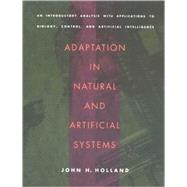
Note: Supplemental materials are not guaranteed with Rental or Used book purchases.
Purchase Benefits
What is included with this book?
| Preface to the 1992 Edition | |
| Preface | |
| The General Setting | |
| Introduction | |
| Preliminary Survey | |
| A Simple Artificial Adaptive System | |
| A Complex Natural Adaptive System | |
| Some General Observations | |
| A Formal Framework | |
| Discussion | |
| Presentation | |
| Comparison with the Dubins-Savage Formalization of the Gambler's Problem | |
| Illustrations | |
| Genetics | |
| Economics | |
| Game-Playing | |
| Searches, Pattern Recognition, and Statistical Inference | |
| Control and Function Optimization | |
| Central Nervous Systems | |
| Schemata | |
| The Optimal Allocation of Trials | |
| The 2-Armed Bandit | |
| Realization of Minimal Losses | |
| Many Options | |
| Application to Schemata | |
| Reproductive Plans and Genetic Operators | |
| Generalized Reproductive Plans | |
| Generalized Genetic Operators--Crossing-Over | |
| Generalized Genetic Operators--Inversion | |
| Generalized Genetic Operators--Mutation | |
| Further Increases in Power | |
| Interpretations | |
| The Robustness of Genetic Plans | |
| Adaptive Plans of Type | |
| The Robustness of Plans | |
| Robustness Vis-A-Vis A Simple Artificial Adaptive System | |
| Robustness Vis-A-Vis A Complex Natural Adaptive System | |
| General Consequences | |
| Adaptation of Codings and Representations | |
| Fixed Representation | |
| The "Broadcast Language" | |
| Usage | |
| Concerning Applications and the Use of Genetic Plans to Modify Representations | |
| An Overview | |
| Insights | |
| Computer Studies | |
| Advanced Questions | |
| Interim and Prospectus | |
| In the Interim | |
| The Optimal Allocation of Trials Revisited | |
| Recent Work | |
| Possibilities | |
| Glossary of Important Symbols | |
| Bibliography | |
| Index | |
| Table of Contents provided by Publisher. All Rights Reserved. |
The New copy of this book will include any supplemental materials advertised. Please check the title of the book to determine if it should include any access cards, study guides, lab manuals, CDs, etc.
The Used, Rental and eBook copies of this book are not guaranteed to include any supplemental materials. Typically, only the book itself is included. This is true even if the title states it includes any access cards, study guides, lab manuals, CDs, etc.